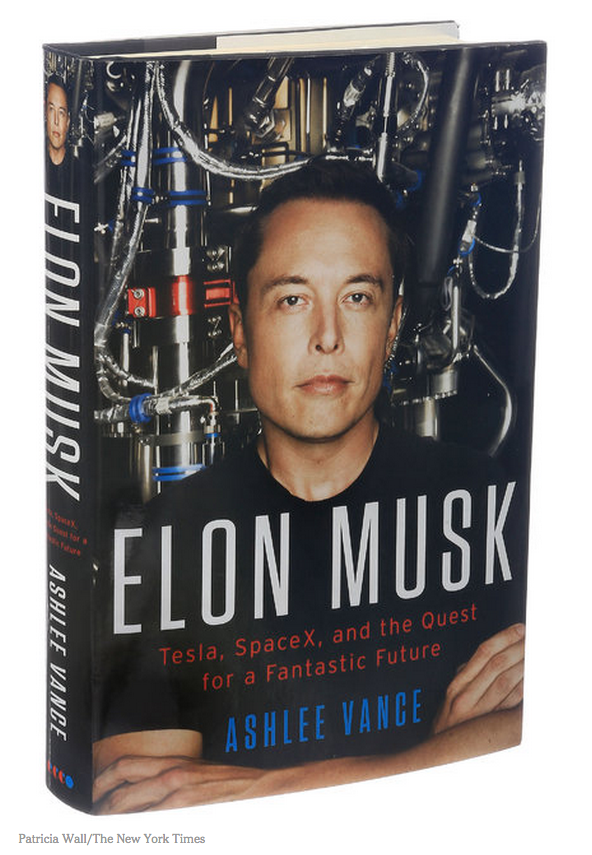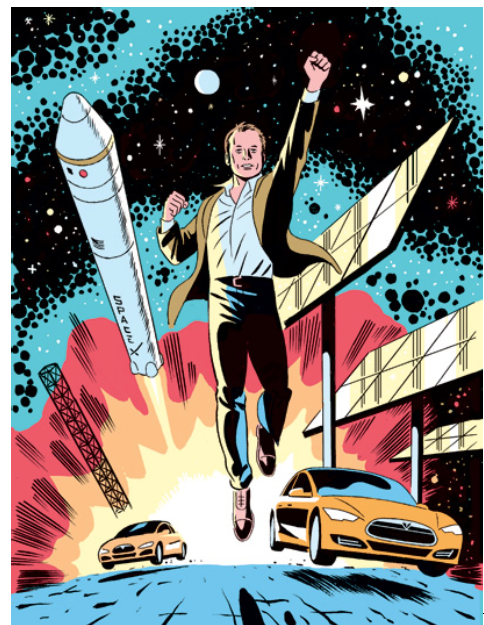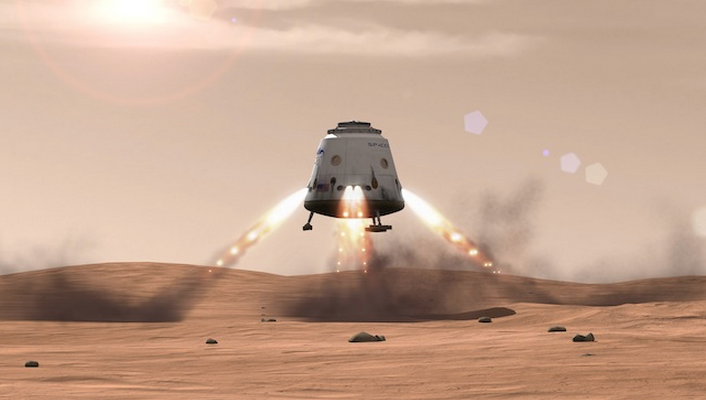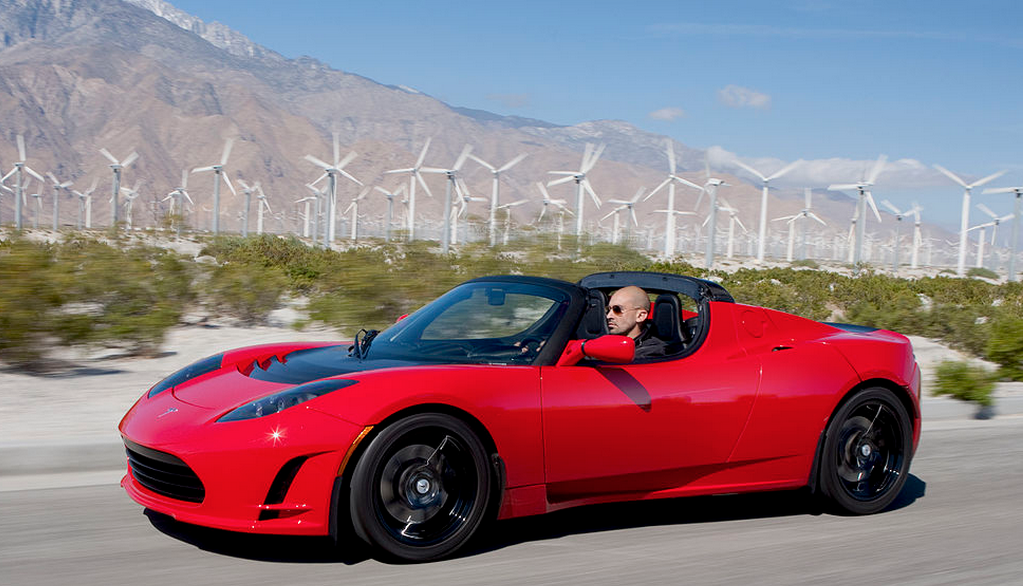Elon Musk, Visioneer?
In 2013, shortly after The Visioneers came out, the publisher sent me on a short book tour. At talks I gave - from San Jose, Los Angeles, & Philadelphia to Seattle and Washington DC - the question I heard most from audiences was "Who is a visioneer today?" My answer was always "Elon Musk."This week, a new biography of Musk by tech journalist Ashlee Vance comes out. I'm looking forward very much to reading it. (With a subtitle of "...the Quest for a Fantastic Future," how could I not?) In the meantime, I thought I would revisit that question that audiences asked me - is Musk a visioneer? The title of my book is a portmanteau of visionary and engineer. The term "visioneer" refers to a person with a hybrid set of talents and interests - someone who has a robust and expansive view of the future; someone who also has the technical chops - usually bolstered by a degree in science or engineering; and, finally, someone who is eager to bring that vision to a wider audience (this could be the public, investors, policy makers).I anchored my book around two such visioneers - physicist Gerard O'Neill and engineer K. Eric Drexler. O'Neill was famous for his promotion of space settlements in the 1970s. Drexler achieved notoriety for his advocacy in the 1980s and 1990s for a radical form of molecular engineering that he christened nanotechnology.How does Musk's background and interests compare?
In the meantime, I thought I would revisit that question that audiences asked me - is Musk a visioneer? The title of my book is a portmanteau of visionary and engineer. The term "visioneer" refers to a person with a hybrid set of talents and interests - someone who has a robust and expansive view of the future; someone who also has the technical chops - usually bolstered by a degree in science or engineering; and, finally, someone who is eager to bring that vision to a wider audience (this could be the public, investors, policy makers).I anchored my book around two such visioneers - physicist Gerard O'Neill and engineer K. Eric Drexler. O'Neill was famous for his promotion of space settlements in the 1970s. Drexler achieved notoriety for his advocacy in the 1980s and 1990s for a radical form of molecular engineering that he christened nanotechnology.How does Musk's background and interests compare?  First, there's the obvious - Musk is a celebrity...the living model for Tony Stark aka Ironman. O'Neill, on the other hand, is largely a footnote to history, except among space and tech buffs while Drexler is living in semi-anonymity in the U.K. after his nano-star rose and fell.But all three shared a passion for space exploration. Drexler, for example, was a devotee of O'Neill's ideas in the 1970s and his popular books on nanotech pitch molecular engineering as a path to the stars. Even though Musk's fantastic successes with SpaceX seem to speak to more prosaic interests - launching people and things into orbit - the South African-born entrepreneur has been an outspoken champion of making humanity a multi-planet species with Mars as the target. As Musk himself quipped - "I'd like to die on Mars. Just not on impact."
First, there's the obvious - Musk is a celebrity...the living model for Tony Stark aka Ironman. O'Neill, on the other hand, is largely a footnote to history, except among space and tech buffs while Drexler is living in semi-anonymity in the U.K. after his nano-star rose and fell.But all three shared a passion for space exploration. Drexler, for example, was a devotee of O'Neill's ideas in the 1970s and his popular books on nanotech pitch molecular engineering as a path to the stars. Even though Musk's fantastic successes with SpaceX seem to speak to more prosaic interests - launching people and things into orbit - the South African-born entrepreneur has been an outspoken champion of making humanity a multi-planet species with Mars as the target. As Musk himself quipped - "I'd like to die on Mars. Just not on impact." Obviously, Musk was massively more successful at commercializing his visions - his success with PayPal provided the bankroll and business credibility to launch ventures like Tesla Motors and SpaceX. But O'Neill once started a tech company called Geostar - the goal was to provide satellite-based communication and location services. Think of a device that would allow you to know where you are and also to talk to people. What's that? You have one? Hmmm. Well, O'Neill launched his company in 1983, when Steve Jobs was just dreaming - maybe - about the iPhone. O'Neill attracted investors such as physicist Luis Alvarez and Hewlett-Packard's tech guru Barney Oliver. Geostar, with O'Neill's guidance, raised millions of dollars and carried out ground tests until its founder's diagnosis of leukemia in 1985 ended the effort.
Obviously, Musk was massively more successful at commercializing his visions - his success with PayPal provided the bankroll and business credibility to launch ventures like Tesla Motors and SpaceX. But O'Neill once started a tech company called Geostar - the goal was to provide satellite-based communication and location services. Think of a device that would allow you to know where you are and also to talk to people. What's that? You have one? Hmmm. Well, O'Neill launched his company in 1983, when Steve Jobs was just dreaming - maybe - about the iPhone. O'Neill attracted investors such as physicist Luis Alvarez and Hewlett-Packard's tech guru Barney Oliver. Geostar, with O'Neill's guidance, raised millions of dollars and carried out ground tests until its founder's diagnosis of leukemia in 1985 ended the effort. Controversy swirls around Musk today just as it did, in more limited fashion, with O'Neill and Drexler. Drexler's vision for nanotechnology inspired many in the public as well as some scientists. Policy makers used - or even co-opted - the popularity of nanotechnology to develop a less expansive national R&D program. For Musk, much of the press concerns his personal life as much as it does his technological visions or his business activities. In 2012, for example, Musk made a much hyped and heralded announcement about his vision for a high-speed transport system called the Hyperloop.
Controversy swirls around Musk today just as it did, in more limited fashion, with O'Neill and Drexler. Drexler's vision for nanotechnology inspired many in the public as well as some scientists. Policy makers used - or even co-opted - the popularity of nanotechnology to develop a less expansive national R&D program. For Musk, much of the press concerns his personal life as much as it does his technological visions or his business activities. In 2012, for example, Musk made a much hyped and heralded announcement about his vision for a high-speed transport system called the Hyperloop. Gerard O'Neill - who loved big engineering projects, especially those connected to trains and transportation - would have appreciated this idea. In the 1970s - with NASA funding - O'Neill spent a year at MIT working on his "mass driver" concept. This used electromagnetic force to propel objects at high speeds. Shortly before his death in 1992, O'Neill speculated about how this might be used as the basis for a train system. He called this VSE - short for velocity, silence, efficiency. Unrealized plans for high-speed trains and transport systems abound, of course. But it's hard not to see slight shades of O'Neill's visions in Musk's techno-dreams.However, when we start to think about how these visions of the technological future might be realized, things diverge. O'Neill's vision for the "humanization of space", as he phrased it, was tied to a NASA-based model. He was hard-pressed to realistically argue for space settlements without invoking some large Apollo-scale program. Drexler went in the opposite direction. Nanotechnology, he argued, was potentially too dangerous - remember "gray goo"!? - to be a government-developed technology and, moreover, this wouldn't comport with the libertarian-rooted political views he had in the late 1980s. Musk has managed to split the difference - SpaceX and Tesla are private companies. yet, SpaceX's biggest customer is NASA while those Tesla cars motor about on the public infrastructure and are charged on the public grid.
Gerard O'Neill - who loved big engineering projects, especially those connected to trains and transportation - would have appreciated this idea. In the 1970s - with NASA funding - O'Neill spent a year at MIT working on his "mass driver" concept. This used electromagnetic force to propel objects at high speeds. Shortly before his death in 1992, O'Neill speculated about how this might be used as the basis for a train system. He called this VSE - short for velocity, silence, efficiency. Unrealized plans for high-speed trains and transport systems abound, of course. But it's hard not to see slight shades of O'Neill's visions in Musk's techno-dreams.However, when we start to think about how these visions of the technological future might be realized, things diverge. O'Neill's vision for the "humanization of space", as he phrased it, was tied to a NASA-based model. He was hard-pressed to realistically argue for space settlements without invoking some large Apollo-scale program. Drexler went in the opposite direction. Nanotechnology, he argued, was potentially too dangerous - remember "gray goo"!? - to be a government-developed technology and, moreover, this wouldn't comport with the libertarian-rooted political views he had in the late 1980s. Musk has managed to split the difference - SpaceX and Tesla are private companies. yet, SpaceX's biggest customer is NASA while those Tesla cars motor about on the public infrastructure and are charged on the public grid. I can see a darker side, however, when comparing Elon Musk today with past visioneers like O'Neill and Drexler. It speaks to a broader issue endemic in today's Silicon Valley ecosystem - all three of them were educated at elite Ivy League schools. More problematic - all three are white men.A question I often got on my book tour was "where are the women and people of color in your story?" This was always an uncomfortable moment for me - there weren't many and I tried to explain why this was the case. The issue had to be confronted head-on but the answer was always unsatisfying, rooted not as it was in the history I had written but in larger systemic failures in society. In the end, I encouraged my audience to think about ways in which visioneers like Musk (or O'Neill and Drexler) were educated, encouraged, nurtured that resulted in others being left out. Rephrased - Is Musk's success story a synecdoche for Silicon Valley's corporate monoculture that slights women, blacks, Hispanics, et al.? I admire what Musk has accomplished in the technological realm. I'm stoked to read Vance's biography to learn more (reviews I've read are positive). I'd like to think Musk stands as an inspiration for young engineers of all backgrounds to think about they might shape the technological future. And, of course, I wonder how he will be viewed as a historical figure 50 years from now. Largely forgotten? Like the tycoons - Carnegie, Vanderbilt, Rockefeller - of the First Gilded Age?Perhaps Musk will surprise us yet again and turn his visioneering skills to crafting not just a cooler technological future but a more robust and equitable social future as well.
I can see a darker side, however, when comparing Elon Musk today with past visioneers like O'Neill and Drexler. It speaks to a broader issue endemic in today's Silicon Valley ecosystem - all three of them were educated at elite Ivy League schools. More problematic - all three are white men.A question I often got on my book tour was "where are the women and people of color in your story?" This was always an uncomfortable moment for me - there weren't many and I tried to explain why this was the case. The issue had to be confronted head-on but the answer was always unsatisfying, rooted not as it was in the history I had written but in larger systemic failures in society. In the end, I encouraged my audience to think about ways in which visioneers like Musk (or O'Neill and Drexler) were educated, encouraged, nurtured that resulted in others being left out. Rephrased - Is Musk's success story a synecdoche for Silicon Valley's corporate monoculture that slights women, blacks, Hispanics, et al.? I admire what Musk has accomplished in the technological realm. I'm stoked to read Vance's biography to learn more (reviews I've read are positive). I'd like to think Musk stands as an inspiration for young engineers of all backgrounds to think about they might shape the technological future. And, of course, I wonder how he will be viewed as a historical figure 50 years from now. Largely forgotten? Like the tycoons - Carnegie, Vanderbilt, Rockefeller - of the First Gilded Age?Perhaps Musk will surprise us yet again and turn his visioneering skills to crafting not just a cooler technological future but a more robust and equitable social future as well.